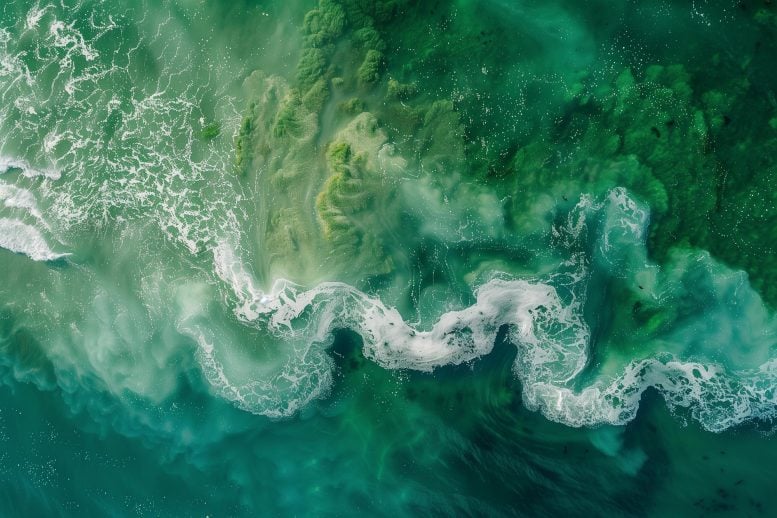A new study has found that a common species of ocean algae plays a key role in producing a common compound that helps cool Earth’s climate. Researchers have determined that Pelagophyceae algae are important producers of DMSP, a compound critical for climate regulation. This finding suggests that higher-than-expected levels of DMSP and its byproduct DMS contribute to the cooling of the global climate. The study underlines the need for further research on these algae and the enzymes involved in DMSP synthesis.
A new discovery shows unexpected ocean algae helping cool Earth
Research from the University of East Anglia (UEA) and the Ocean University of China (OUC) could revolutionize our understanding of how these tiny marine organisms affect our planet. Researchers identified the blooming algae Pelagophyceae as potentially abundant and important producers of a compound called dimethylsulfoniopropionate, or DMSP.
Co-author Professor Jonathan Todd, from UEA’s School of Biological Sciences, said: “Pelagophyceae are among the most widespread algae on Earth but were not previously known as important DMSP producers.
“This discovery is exciting because DMSP is a common anti-stress compound, a food source for other microorganisms, and an important source of climate-cooling gases.”
OUC/UEA PhD student and lead author Dr Jinyang Wang said: “Understanding the role of Pelagophyceae in DMSP production means we need to rethink how much of this compound is produced and how it affects our climate.”
Effect of DMSP on climate regulation
Marine microorganisms produce billions of tons of DMSP in the Earth’s oceans each year, helping them survive by protecting against a variety of stresses such as salinity changes, cold, high pressure, and oxidative stress. More importantly, DMSP is the main source of a climate-active gas called dimethyl sulfide (DMS), also known as marine smelt.
Implications for global climate
This study shows that DMSP production and the resulting DMS release are likely higher than previously thought and highlights the key role of microbes in global climate regulation. DMS also acts as a signaling molecule that directs marine organisms to food and deters predators. When DMS is released into the atmosphere, the oxidation products of DMS help form clouds that draw sunlight away from the Earth, effectively cooling the planet.
This natural process is important for regulating Earth’s climate and is also extremely important to the global sulfur cycle, which represents the main pathway by which sulfur from the oceans returns to land.
Discovery of key enzymes in DMSP production
UEA and OUC have established a China-UK Joint Research Center to promote advanced research and education in marine and ocean sciences. Dr Andrew Curson from UEA was a key member of the team that identified new enzymes responsible for DMSP synthesis in a variety of bacteria, photosynthetic cyanobacteria and algae.
Dr Kerson said: “The identity of these enzymes allowed our team to identify Pelagophyceae as potentially widespread and important producers of DMSP.”
Co-author Professor Xiao-Hua Zhang, from the OUC College of Marine Life Sciences, said: “By identifying the enzymes involved in DMSP production, scientists can better understand and predict the behavior of these ecosystem-degrading, brown tide-forming algae. and their impact on global climate change.” effects on.
“This study also raised the question of other unidentified versions of the enzymes required for DMSP production or completely different pathways for its production that are currently unknown.”
Future directions of marine biology research
More research on Pelagophyceae algae in their natural habitat is needed, as well as more detailed studies on other marine organisms, the researchers say. Better measurement of DMSP levels in the environment, production and degradation rates, and the multitude of enzymes involved in DMSP formation are also critical for further development of the field.
Source: Port Altele
